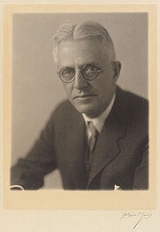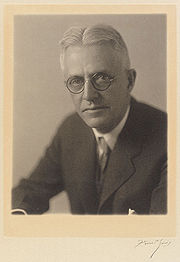
William Draper Lewis
Encyclopedia

University of Pennsylvania Law School
The University of Pennsylvania Law School, located in Philadelphia, Pennsylvania, is the law school of the University of Pennsylvania. A member of the Ivy League, it is among the oldest and most selective law schools in the nation. It is currently ranked 7th overall by U.S. News & World Report,...
(1896-1914) and the founding director (1923-1947) of the American Law Institute
American Law Institute
The American Law Institute was established in 1923 to promote the clarification and simplification of American common law and its adaptation to changing social needs. The ALI drafts, approves, and publishes Restatements of the Law, Principles of the Law, model codes, and other proposals for law...
.
Personal life and education
William Draper Lewis was an Episcopalian, probably of Quaker stock, born in Philadelphia in 1867. He received a B.S. from Haverford CollegeHaverford College
Haverford College is a private, coeducational liberal arts college located in Haverford, Pennsylvania, United States, a suburb of Philadelphia...
in 1888 and both an LL.B. and a Ph.D. in economics from the University of Pennsylvania
University of Pennsylvania
The University of Pennsylvania is a private, Ivy League university located in Philadelphia, Pennsylvania, United States. Penn is the fourth-oldest institution of higher education in the United States,Penn is the fourth-oldest using the founding dates claimed by each institution...
in 1891.
University of Pennsylvania Law School
In 1896, Lewis, though only 29, was the perfect candidate for the first full-time dean of the University's Law SchoolUniversity of Pennsylvania Law School
The University of Pennsylvania Law School, located in Philadelphia, Pennsylvania, is the law school of the University of Pennsylvania. A member of the Ivy League, it is among the oldest and most selective law schools in the nation. It is currently ranked 7th overall by U.S. News & World Report,...
. His law practice had all but disappeared under what was to become a lifelong obsession: the cataloging of American law. Only four years out of law school, he had committed himself to an overwhelming smorgasbord of editorial projects, the major ones in conjunction with friend, business associate and later U.S. Senator George Wharton Pepper. Notably, the two men served as editors of the University of Pennsylvania Law Review
University of Pennsylvania Law Review
The University of Pennsylvania Law Review is a law review focusing on legal issues, published by an organization of second and third year J.D. students at the University of Pennsylvania Law School. It is the oldest law journal in the United States, having been published continuously since 1852...
, published at the time under the name American Law Register and Review.
Lewis saw a national role for the Law School, one that would fill the role of the fading apprenticeship system for young lawyers. Development of a core of full-time faculty sat at the top of Lewis’s agenda, but he gave equal attention to curriculum, admissions and graduation standards, and facilities — in particular the library. A pragmatist and a humanist, he established the tradition at Penn Law of the dean as first among equals.
Lewis treated his colleagues and friends with enormous good humor and tolerance. He was, perhaps more than anyone before or since at the Law School, a grand master of consensus. He was also continually concerned with student welfare; a goodly part of each faculty meeting was given over to the discussion of student "petitions" for relief of one kind or another.
He cared about, stewed over, and poked into every conceivable aspect of the School. He arranged stays for sick students at sanitariums. He even toured the guts of his grand new building (opened in 1900) to understand and correct malfunctions of the heating and ventilation system.
A compulsive communicator, Lewis dictated letters a dozen at a time and served as recording secretary for faculty meetings. His mailings to prospective students and their parents could run to three or four typed pages, intermixing his philosophy of education with practical concerns directed to the inquirer’s situation.
However, though well-loved by students and universally referred to as "Uncle Billy," he appears to have been rather a mess as a teacher. At a 1934 dinner for Lewis, Pepper called him "one of the most lovable and whimsical personalities which any of us have met in a lifetime. ... [W]e reserve the right to rejoice in his split infinitives, his mixed metaphors and the strange beings with which his imagination peopled the cases discussed in his classroom."
Lewis could be quite deliberately funny, sometimes getting himself in hot water. To the secretary of the University he writes in 1900: "I have received your formal apology for your very grave mistake concerning the University Council. What it was all about I have not the slightest idea, but evidently if anything was wrong, the letter before me makes everything right."
He was also a manager of the 1907-founded Comparative Law Bureau of the American Bar Association
American Bar Association
The American Bar Association , founded August 21, 1878, is a voluntary bar association of lawyers and law students, which is not specific to any jurisdiction in the United States. The ABA's most important stated activities are the setting of academic standards for law schools, and the formulation...
, whose Annual Bulletin was the first comparative law
Comparative law
Comparative law is the study of differences and similarities between the law of different countries. More specifically, it involves study of the different legal systems in existence in the world, including the common law, the civil law, socialist law, Islamic law, Hindu law, and Chinese law...
journal in the U.S.
Political career
During the later years of his deanship, Lewis’s attention was diverted and all but consumed by the politics of the Progressive Republican movement. A confidant of Theodore RooseveltTheodore Roosevelt
Theodore "Teddy" Roosevelt was the 26th President of the United States . He is noted for his exuberant personality, range of interests and achievements, and his leadership of the Progressive Movement, as well as his "cowboy" persona and robust masculinity...
, Lewis chaired the platform committee for Roosevelt’s failed run for President on the Bull Moose ticket in 1912. In his most politically impassioned (or naïve) maneuver, Lewis ran for Pennsylvania governor in 1914 on a straight Progressive platform, a dalliance which forced his resignation from the deanship but took him no closer to the governor’s mansion. He remained on the Law School faculty until 1924.
American Law Institute
At the 1920 and 1921 meetings of the Association of American Law SchoolsAssociation of American Law Schools
The Association of American Law Schools is a non-profit organization of 170 law schools in the United States. Another 25 schools are "non-member fee paid" schools, which are not members but choose to pay AALS dues. Its purpose is to improve the legal profession through the improvement of legal...
, proposals which Lewis encouraged urged the creation of an "institute of law" to elucidate the progress of the common law. In 1923, the American Law Institute
American Law Institute
The American Law Institute was established in 1923 to promote the clarification and simplification of American common law and its adaptation to changing social needs. The ALI drafts, approves, and publishes Restatements of the Law, Principles of the Law, model codes, and other proposals for law...
became a reality. Lewis, as its first director, shaped its agenda of preparing "restatements" of the law, serving until 1947, a year before his death.
Though the ALI’s restatements met with complaints that they undermined the fluidity of the common law and echoed the codification of European civil law, it is fair to say Lewis’s work as director rank him as the single most influential figure in the pragmatic development of 20th-century American law.
External links
- Guide to the Personal Correspondence of William Draper Lewis at the Biddle Law Library Archives
- The William Draper Lewis House, ca. 1892, part of the Awbury Historic DistrictAwbury Historic DistrictThe Awbury Historic District is a historic area in the East Germantown neighborhood of Philadelphia, Pennsylvania.The district comprises the former summer homes and farms of the extended Cope family, who moved to the area starting in 1849...

